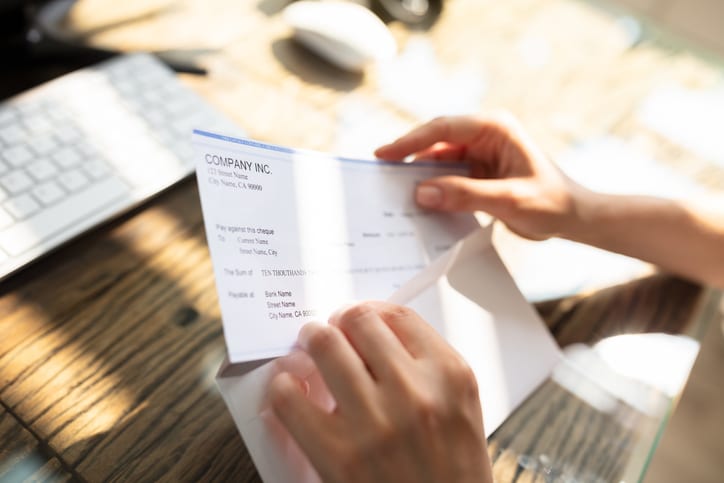Check Scams
Don’t be a victim of a counterfeit check.

Protect Yourself from Rising Check Scams
Be aware of the most common check scams that continue to trouble individuals from around the world.
Lottery Scam
You receive a call, email or letter from a company such as: Megabucks Traveller’s Draw, North American Lottery, Publisher’s Clearing House, etc. stating that you just won a prize or large sum of money and that the enclosed check is to be used to pay taxes on your winnings. You are instructed to deposit the check into your personal account and wire a portion back to the company handling your winnings.
After you wire the money, your bank notifies you that the check deposited is counterfeit and you are responsible for paying back the amount you had withdrawn.
Online Shopping Scam
You are selling something on e-bay, craigslist, or Facebook marketplace and are contacted by a buyer that is interested in purchasing your item. The buyer tells you he will send you a check or money order to complete the purchase. You receive the check via mail, but find the check is for more than the selling price. You call the buyer to inform him of his mistake. The buyer asks you to deposit the check and wire him the difference minus a little bonus for your trouble. You deposit the check and send the difference back to the buyer only to discover that the check deposited is counterfeit. You are now responsible for covering the amount withdrawn.
Facebook marketplace is a relatively new online buy and sell platform that also introduces the risk of using person-to-person payment apps or services. You list an item on Facebook marketplace and are contacted quickly by a buyer who is willing to pay using an app such as Zelle, Venmo, or CashApp. Shortly after receiving payment, you get an email from a spoofed address stating that you will need more funds to accept the transfer of the payment. The buyer will then give you the funds and then pressure you into repaying them for the fees they incur on your behalf. No real funds were sent over by the scammer, so if you refund them, you will lose any money sent to them.
Mystery Shopper Scam
You decide to answer a help wanted ad or you receive an unsolicited phone call about being a mystery shopper. They tell you that you will be evaluating the customer services of a retailer that sells gift cards, money orders, or wire transfer services such as Western Union and Money Gram. You receive a check and are told to deposit it in your personal bank account and wire the remaining funds back to the ’employer’.
After you’ve wired the money back to your new ’employer’, you find out that the check is counterfeit. You are now responsible for repaying the bank the amount you have withdraw
Government Grant Scam
You receive a letter, phone call, or email that states you have been approved for a government grant to be used for education, home repair, business expenses, or unpaid bills in a large sum of over $10,000. The check included with the message is meant to be used to pay fees to the appropriate federal institution. The message states you are to deposit the check and wire the money back to the sender.
Once you have wired the money back to the sender, you find out the check is counterfeit. You are now responsible for repaying the bank the amount you have withdrawn.
Cashier’s Check Scam
A counterfeit cashier’s check scam occurs when a customer unknowingly deposits the check into their bank account and then withdraws funds based on their availability schedule. The consumer and banker usually assume that the deposited check is good before the check has cleared the bank it was drawn on due to the official appearance of the check. A deposited check can take several days or weeks to either make its way to the bank it is drawn on for payment, or to be returned unpaid.
Once the bank is informed that a deposited check is counterfeit, it will deduct the amount of the check from the account it was deposited to and the consumer is responsible for any lost funds.
Additional Resources
Equip yourself with the latest insights, trends, and precautions against various scams with these resources:
Latest Insight & Education
Stay informed and empowered with our collection of articles and tools. Whether you’re looking to improve your financial knowledge or explore tips for better banking, our resources are here to guide you every step of the way.
Remember that WaterStone Bank will not call you directly and ask for your personal information.
If you are sending loan related payments or wire transfers, remember that WaterStone bank will not email you wire instructions containing your personal account information such as routing and or account numbers. To avoid falling victim to scamming, be sure to confirm all your information before approving and sending wire and ACH transfers.
If you have any questions or believe you may have fell victim to a scam, please call our Customer Support Center or your local branch immediately.
